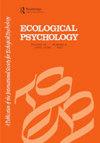冷熵:评估冷应激中认知适应性的个体差异
IF 1.7
3区 心理学
Q3 PSYCHOLOGY, EXPERIMENTAL
引用次数: 1
摘要
人类的认知在多种环境中展开,包括那些与极端压力源有关的环境。在这样的环境中成功地测量和建模行为是非常困难的。目前的努力旨在评估在冷应激下认知表现的稳定性和灵活性的变化,错误的个体差异和生理相关。57名服役人员在冬季完成了冷水浸泡。受试者被要求在室外池塘中浸泡10分钟,换上干衣服,并试着重新保暖。简单的反应时间和匹配样本任务在90分钟的过程中完成。为了评估响应稳定性,对每个任务的响应时间序列计算样本熵。分层聚类应用于样本熵值识别两类个体。高影响组表现出较低的稳定性和较弱的灵活性,表现为较高的自相关和较多的遗漏误差,浸泡前和浸泡后的手温较低。研究结果在冷应激、适应性行为和冷应激的背景下进行了讨论。本文章由计算机程序翻译,如有差异,请以英文原文为准。
Cold Entropy: Assessing Individual Differences in Cognitive Adaptability during Cold Stress
Abstract Human cognition unfolds in a multitude of environments, including those that are associated with extreme stressors. Successfully measuring and modeling behaviors in such environments is inherently difficult. The current effort aimed to assess variation in stability and flexibility of cognitive performance during cold stress, individual differences in errors, and physiological correlates. Fifty-seven service members completed cold water immersion during winter months. Individuals were required to immerse themselves in an outdoor pond for 10 minutes, reclothe into dry clothing, and attempt to rewarm. Simple reaction time and match-to-sample tasks were completed throughout the 90 minute procedure. To assess response stability, sample entropy was computed for the response time time-series of each task. Hierarchical clustering applied to sample entropy values identified two clusters of individuals. One highly affected group demonstrated low stability and weak flexibility by way of higher autocorrelation and more omission errors, and had lower hand temperature pre- and post-immersion. Results are discussed within the context of cold stress, adaptive behaviors, and cold stress.
求助全文
通过发布文献求助,成功后即可免费获取论文全文。
去求助
来源期刊

Ecological Psychology
PSYCHOLOGY, EXPERIMENTAL-
CiteScore
3.30
自引率
10.50%
发文量
8
期刊介绍:
This unique journal publishes original articles that contribute to the understanding of psychological and behavioral processes as they occur within the ecological constraints of animal-environment systems. It focuses on problems of perception, action, cognition, communication, learning, development, and evolution in all species, to the extent that those problems derive from a consideration of whole animal-environment systems, rather than animals or their environments in isolation from each other. Significant contributions may come from such diverse fields as human experimental psychology, developmental/social psychology, animal behavior, human factors, fine arts, communication, computer science, philosophy, physical education and therapy, speech and hearing, and vision research.
 求助内容:
求助内容: 应助结果提醒方式:
应助结果提醒方式:


